A Second World (Part 2 OF 3)

(lib30729.gif)
■"Actual Shelf Page"

How come two DVDs of the same title you borrowed?

Number 254 is an American version, which is actually a remake of Number 253---the Japanese version.

(lib30729b.gif)
■"Actual Catalogue Page"
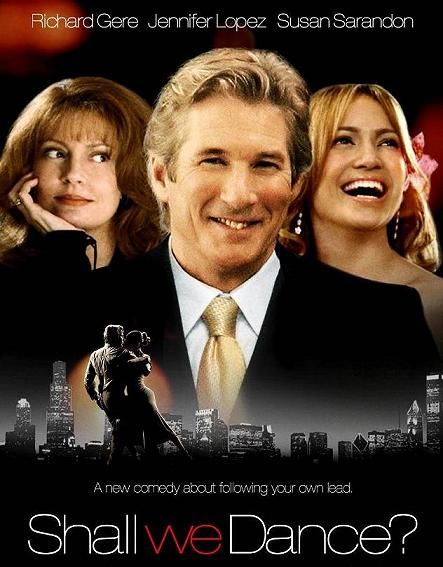
(dance01.jpg)
SHALL WE DANCE (2004)
Official Movie Trailer
<iframe width="500" height="350" src="//www.youtube.com/embed/Mr3AjEn2uO8" frameborder="0" allowfullscreen></iframe>
Brief Storyline
A lawyer's life and marriage take an unexpected turn when he follows a woman to a dance studio and begins to take lessons and finds he has a passion for dance. His wife thinks he is having an affair and hires a detective to follow him.

So, Kato, you think the lawyer in the movie is seeking another world of his own when he gets bored with his own work, huh?

Yes, I do. John Clark (played by Richard Gere) is a lawyer with a charming wife and loving family, but he nevertheless feels that something is missing as he makes his way every day through the city.
Then what happens?
Well... Each evening on his commute home through Chicago, John sees a beautiful woman staring with a lost expression through the window of a dance studio. Haunted by her gaze, John impulsively jumps off the train one night, and signs up for ballroom dancing lessons, hoping to meet her.
So, John is seeking a love affair, isn't he?
Oh, no, no, no ... he's seeking what he thinks is missing from his seemingly happy yet monotonous life.
Anyway, he's looking for a charming and exquisitely pretty woman, isn't he?
Oh, no, no, no ... he's searching for what he believes is missing from his family life.
What is the beautiful woman staring with a lost expression?
Her name is Paulina played by Jennifer Lopez. She is a dance teacher, a well-known figure on the ballroom dance circuit who once competed at the world-famous Blackpool international dance competition. However, she lost the championship years before.
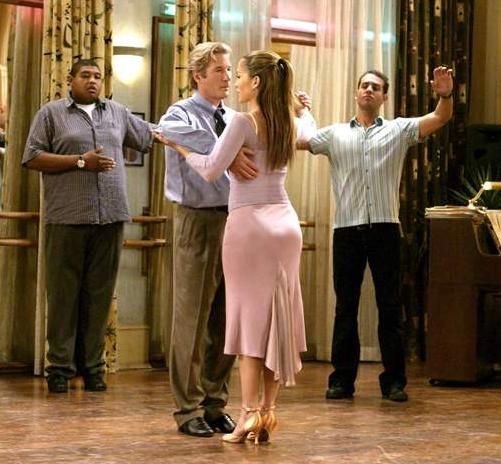
(dance03.jpg)

I see ... So, Paulina also thinks that something is missing in her life, huh?

That's right.
Kato, are you saying that John is seeking a second world while Paulina is trying to regain a once-lost world?
Yes and no... Actually, Paulina wasn't aware of her once-lost world. She'd rather stay away from it. But unconciouslly, she knows that she has to do something to overcome the past failure.
Does she face the music?
Yes, but not until she realizes that John now falls in love with dance itself.
Why is that?
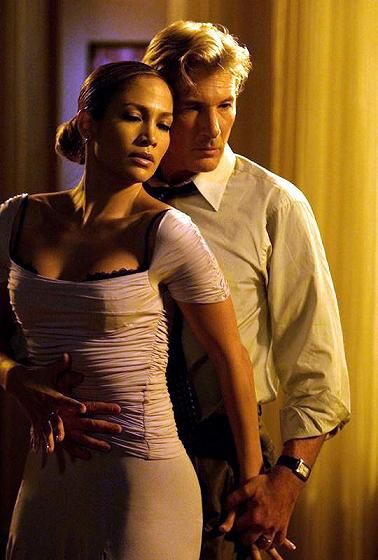
(dance05.jpg)

Well... once John woos Paulina, but she icily tells John she hopes he has come to the studio to seriously study dance and not to look for a date.

Does Paulina notice John's seriousness?
Yes, she does as time goes by. Inspired by John's enthusiasm, Paulina now takes up competing again and decides to leave for Blackpool.
I see... but how come you viewed the Japanese version as well.
Actually, I saw the Japanese version first, then I noticed that Peter Chelsom did a remake out of it.
Which one did you like?
Of course, I like the Japanese version more than the American.
Why is that?

(lib30729c.gif)
■"Actual Catalogue Page"
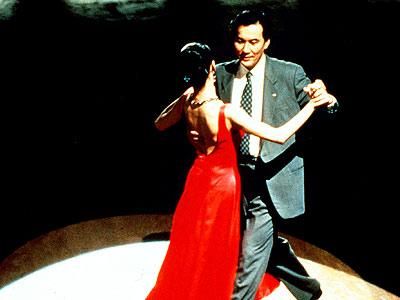
(dance28.jpg)
Shall We Dance? (1996)
(Japanese Version)
<iframe width="500" height="350" src="//www.youtube.com/embed/zQWEhPYwuY4" frameborder="0" allowfullscreen></iframe>

I enjoyed the Japanese version so much that the American remake looks shadowed in the back of my mind simply because ballroom dancing in Japan is considered "weird" or "sissy" among men, if not the Japasene in general, while it is not abnormal at all in the States. For a Japanese man to join the dancing class, therefore, he needs a great deal of courage and expects a lewd remark from his coworkers once they finds it out.

Really?
Yes... So, a Japanese man in the class always feels tension and senses a spying eye around as if a gay man had to have a courage to come out when worse comes worst. I can't feel this tension at all in the American remake.
What else?
Compared to her counterpart in the Japanese version, Paulina doesn't show her character change in such a dramatic way as Mai does in the Japanese version.
So you dislike the American version, don't you?
No, not really, the remake offers pleasures of its own in the sense that it focuses more on entertainment rather than on serious character study. For example, the end scene shows everyone afterwards: Link and Bobbie are now together; Chic, who was actually gay, dances at a club with his partner; Miss Mitzi finds a new partner, and they are happy together; John and Beverly are back to normal and dance in the kitchen; Vern, newly married to his fiancée, dances with her at their wedding; the private investigator that Beverly hired, starts up dance lessons; and Paulina, with a new partner, competes at Blackpool, the competition that she had lost years before.
... sounds interesting!
Anyway, Diane, when you see the movie, I think you'll feel like taking ballroom dancing lessons at West End Community Center.

(laugh16.gif)
【Himiko's Monologue】

In the Japanese version, Shohei Sugiyama (Kōji Yakusho) is a successful office worker, with a house in the suburbs, a devoted wife, Masako (Hideko Hara), and a teenage daughter, Chikage (Ayano Nakamura).
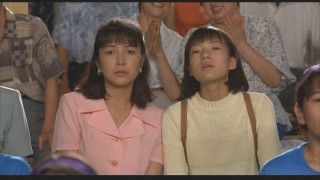
(dance27.jpg)
He works as a section manager for a firm in Tokyo.
Despite these external signs of success, however, Sugiyama begins to feel as if his life has lost direction and meaning and falls into depression.
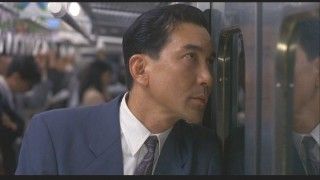
(dance25.jpg)
I think most of the Japanese workers feel this way.
In any case, I hope Kato will write another interesting article soon.
So please come back to see me.
Have a nice day!
Bye bye ...

(hand.gif)
(To be followed)